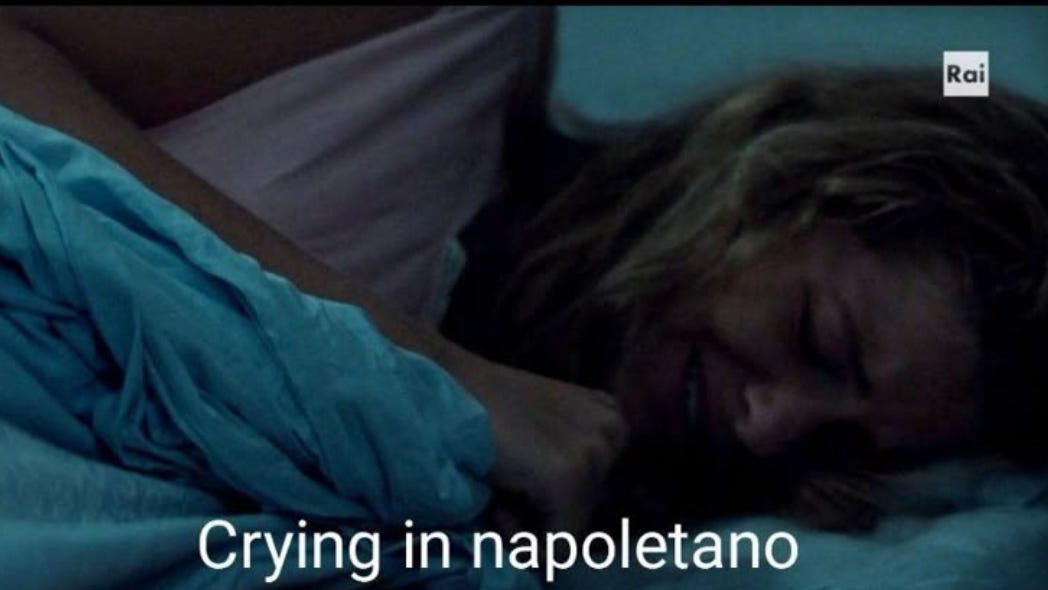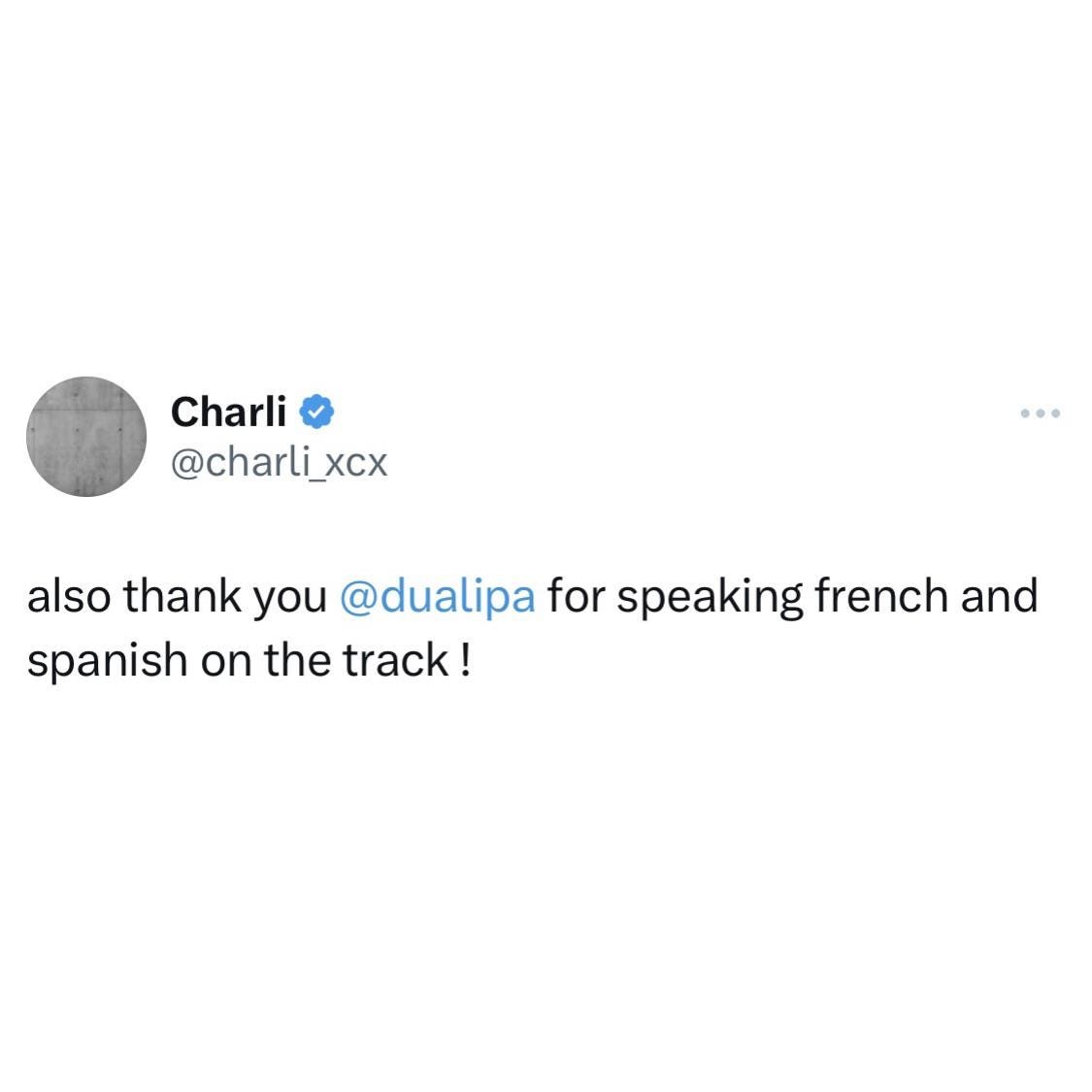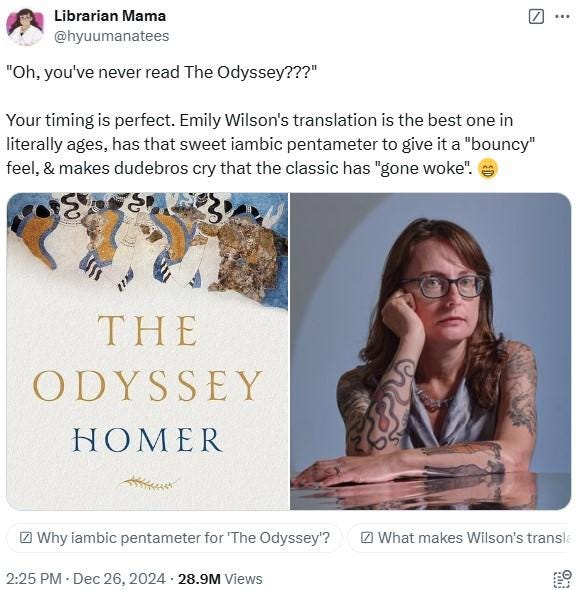Thesis: Translation in its simplest form is a means of communication. At its most complex, it is a means to power, cultural entry, and status. When reading and consuming media, it is almost as important if not more important to consider who is telling you the story and what they may stand to gain (or lose) in doing so.
In 2021 when I made the decision to take on the behemoth (lovingly dubbed “The Brick” by its fans) that is Les Miserables, I simply grabbed the paperback copy that my bookstore had on hand. And then after years of using it as a doorstop during a move, I decided to actually read the thing.
I had a lot of hesitations when I picked it up. I grew up loving the musical, but I struggle with the classics. They’re weighty and often just a little too removed from our modern lexicons for me to wrap my head around. I want to enjoy the book I am reading, not think of it as a chore. But within the first twenty-five pages I was hooked. And more than that, I was genuinely shocked at how digestible the novel felt (Spark Notes, your services were not needed here). So I did something I don’t often do: I sought answers and I read the translator’s introduction.
The translator of my particular copy, Norman Denny, emphasized that his work was to bring the text to the modern audience. It remained faithful to Victor Hugo’s original story, but it also wasn’t a literal word for word translation, because the meanings of words evolve over time, and because French doesn’t always literally translate to English. Denny sought in his work to evoke within me the same feelings that the people of 1862 would have felt when reading the work originally – not to bog me down and add extra layers of my own translation work to understand the story. (Do we think they discussed the Marius/Eponine/Cosette love triangle in the 1860s? Lmk.)
This module isn’t about Les Miserables—I wouldn’t do that to you (full disclosure, it took me a little over a year to power through all 1,232 page saga). It is about the relationships we have with the authors of texts—some we might not even be aware we have.
Words, Words, Words
Translators are an oft overlooked group. I wonder sometimes how many books we’ve picked up only to later learn that they aren’t in their original publication language. It isn’t a hard and fast rule that you need to identify and promote the translator on the cover of a novel. If you compare the US and UK editions of Jacqueline Harpman’s I Who Have Never Known Men, for instance, you’ll notice that the US cover advertises the translator who worked on the book, whereas the UK does not. It’s the same translator for both, and yet only one publisher chose to prominently share that Ros Schwartz is responsible for helping those who don’t read French understand Harpman’s bleak and harrowing dystopian narrative.
The translator is always mentioned in the body of the book somewhere — it isn’t like ghost writing, where there is often a contractual relationship that determines whether or not the ghost writer is revealed to the reader. It isn’t uncommon for a translator’s name not to appear on the cover of the novel.
I spoke once to a translator, who I won’t do the disservice of naming here since I can’t properly quote her, and asked if it ever bothered her when she wasn’t prominently featured on the cover of a novel for her work. She said something to the effect of “no, not really, but it’s nice when it happens.” It’s the nature of the job. The novel itself is the important work, and that belongs to the author. Or does it?
My Brilliant Translator (Or, Good As Goldstein)
Sometimes, the translator is quite known to the audience, and it is an important sell to have them on the cover, or at least easy to find somewhere on the book’s outer jacket. Oftentimes this matters most with the classics. For those, the translators can be far and wide, offering people choice in the version of the story they consume. Many people who read Russian novels, for example, are particularly partial to Richard Peaver and Larissa Volokhonsky’s work, while some avoid their style like the plague. For me, I now seek out any of the Penguin Classics translated works because I find them to be the most accessible (more important to me at the current moment than style or perfect accuracy). I look less at the name and more the branding.
But what happens when you aren’t given a choice of who to read through the lens of? When the contemporary novel isn’t translated by multiple authors, but rather, one voice that you are offered to represent another’s?
If you have ever read Elena Ferrante, it is likely you have read Ann Goldstein. That is, if you are reading the English translations of Ferrante’s work. (Side note: If you clocked into Jhumpa Lahiri’s In Other Words, you have also read Goldstein.) Goldstein is Ferrante’s translator of choice, someone who was picked after submitting a sample of her translation work to Ferrante and her team. Though, it is important to note here, Goldstein has never met Ferrante. “Elena Ferrante” is a pseudonym and her identity is only known to a very select few. The relationship between Ferrante and Goldstein occurs on the page, one trusting the other to deliver her prose to the English-speaking world with the thin sheet of anonymity hanging between them.
And deliver Goldstein does. In her profile of Goldstein for The New York Times, Joumana Khatib writes,
“Goldstein has never met Ferrante and communicates with her through her publisher, but she has become one of the best known and most celebrated literary translators in the world as a result of her work on “My Brilliant Friend” and the rest of the author’s Neapolitan quartet. In many ways, their relationship is reciprocal: While Italian readers have known Ferrante for years, it was the translation of her books into English and other languages that catapulted her to international fame.” (Khatib, New York Times)
Ann Goldstein has become deeply woven into the fabric of Ferrante’s novels while at the same time moving (mainly) undetectable to the untrained eye. Perhaps if someone else were to stand at the helm of The Neapolitan Quartet the novels might veer off the course Goldstein charted. To know the scope of Goldstein’s work, one would have to speak both Italian and English, and have the patience to read both, tracking the minutiae that separates the novel from itself.
Goldstein started her career as a copywriter – something that might be serving her well in her work as a translator now. Her former colleague Mary Norris spoke with Khatib about Goldstein, saying,
“She disappears, in a sense. In the way that a copy editor is a sieve for the writer and the language, the same is true of a translator.” But Norris came to see later that “translating is not just like copy editing,” she said. “It also involves being a writer. Ann gives that part of herself to it.” (Khatib, New York Times).
Ann Goldstein elevated Ferrante’s work while maintaining its identity. But what happens when the work requires translation that detracts or evolves to realize itself in ways we may not be comfortable confronting?
Hey, Siri - Play ‘Talk, Talk’ by Charli XCX
In her 2022 novel Babel, R.F. Kuang challenges our idea of translation as a simple process. Or maybe you never thought it was simple at all, but rather a direct and formulaic act. All you are doing is making the text recognizable to another reader, right?
“The tagline of R.F. Kuang’s bestselling 2022 novel Babel (or Babel, Or the Necessity of Violence: An Arcane History of the Oxford Translators’ Revolution) is: “an act of translation is always an act of betrayal.” Thanks to the work of countless translation scholars, we know what this tagline means in the literal sense,” writes Kari Stein in her essay, Uncovering an “Arcane” History: How R.F. Kuang Demystifies the Entanglement of Translation, Academia, and Colonialism. She continues,
“In order to translate from one language into another, there is an unavoidable loss of meaning in the process. Whether one chooses, as Walter Benjamin proposes, to preserve the feeling of the original text while adding syntactical or linguistic flourishes, or to do the opposite, as Vladimir Nabokov encourages, and translate in only the most literal word-for-word terms no matter how clumsy, there is always some matter of the original text that is inevitably lost. There is no such thing as an accurate one-to-one translation from any one language into another, and any translator is forced to choose in which way they will “betray” their source text.” (Stein, pg. 1)
Kuang posits in the novel that translation is a means to power (specifically British Imperial power). “Babel collects foreign languages and foreign talent the same way it hoards silver and uses them to produce translation magic that benefits England and England only’” (Kuang 99). She isn’t wrong, and we see this in the modern world often (even if it is done with significantly less magical energy). To provide people with an understanding empowers them to make decisions, enter rooms and conversations previously inaccessible, and allows voices to be heard that may have been lost in the, well, babble. “Words have no meaning unless there is someone present who can understand them.” (Kuang, 159).
With novels, the stakes are a little bit lower. If something is mistranslated or translated with the intent to deter you from the original meaning, it isn’t usually the end of the world. You just would likely have a confusing book club with someone who read the original work. But, if the translator has motives to confuse or biases, and they are translating something vital like the news or a government document or report, it could have serious effects on your understanding and life on a whole that you may not even be aware of. But not all intentions are bad. While some seek to take, others may aim to give.
The Odyssey: All Female Reboot
In 2017, Emily Wilson became the first woman to translate Homer’s The Odyssey. She was praised by many for the way she maintained the structure of the epic poem whilst also making it more accessible and clear. On the other hand, many scholars were pissed about this, preferring a more floral and engaged work. But to be clear, the plot points, structure, and characters are the same. Wilson did not Kidz Bop-ify it. And honestly? Maybe I wouldn’t have lied about reading it in 2011 if her version existed. I’m just saying.
Wilson’s approach is not unlike Norman Denny’s when he approached Les Misérables. In her translator’s note (something commonly found in the translation of the classics but not always in the contemporary sphere) Wilson writes,
“There is a notion, especially in the Anglo-American world, that a translation is good insofar as it disguises its own existence as translation; translations are praised for being ‘natural.’ I hope that my translation is readable and fluent, but that its literary artifice is clearly apparent…The notion that Homeric epic must be rendered in grand, ornate, rhetorically elevated English has been with us since the time of Alexander Pope. It is past time, I believe, to reject the assumption.” (Wilson, pg 82-83). She continues to defend her “simplicity” by stating, “Impressive displays of rhetoric and linguistic force are a good way to seem important and invite a particular kind of admiration, but they tend to silence dissent and discourage deeper modes of engagement.” (Wilson, pg. 83).
Wilson goes even further to say, “My use of contemporary language – rather than the English of a generation or two ago – is meant to remind readers that this text can engage us in a direct way, and also that it is genuinely ancient. My Homer does not speak in your grandparents’ English, since that language is no closer to the wine-dark sea than your own.” (Wilson, pg. 87). To the tune of “The Final Scene” of Andrew Llyod Webber’s “Sunset Boulevard” - that’s Norman Denny! That’s Norman Denny!
Essentially, in her work, Wilson found the key to the boy’s club and forced them to reevaluate the need to impress with the work rather than engage with it. Wilson seeks to extend the language and narrative, while many others look to gate keep and ask you to prove that your admission into the world of Homeric hymns is pure and earned. Men and their egos or whatever.
But reading is, has been, and always will be, political (BookTok, turn the volume up a little on this one – you can 2x speed if you want). Wilson’s translation speaks to R.F. Kuang’s thesis that translation is an act of betrayal. Here, it is not the text itself that Wilson betrays, but rather the idea that literature needs to remain somewhat inaccessible to matter or to “count.”
Later in her introduction, Wilson acknowledges that, "translation always, necessarily, involves interpretation; there is no such thing as a translation that provides anything like a transparent window through which a reader can see the original.” (Wilson, pg. 86). Sure, in order to contemporize the poem, Wilson needed to take some small liberties. She also worked within the constraints of having the “same length as the original, with exactly the same number of lines.” (Wilson, pg. 82). What she really did was offer a new audience a story they can access. She gave them back some power. (It’s me. I am the audience that needed the contemporary lingo.) She unearths what men have tried to hide or gatekeep. She allows for a new interpretation to emerge, breathing life into a story that has existed far beyond any of us reading it today.
Mrs. Worldwide
We don’t need to look as far back as the Homeric hymns to see the effects of women revitalizing stories from the past. Recently, TikTok saw the resurgence of I Who Have Never Known Men, a book that has been translated and available in English since 1997 (then titled, Mistress of Silence.) The book is nearly thirty-years old, so why is it suddenly on every FYP or Instagram feed of anyone who’s ever engaged with book content? I can’t say for sure, but my guess is because it speaks to the current political and social climate of the country. Or maybe because the girlies yearn for the dystopian narratives of The Hunger Games and Divergents past.
Oftentimes, books in translation struggle to make a splash in literary monoculture. Until I perused the shelves of McNally Jackson, I truly never really clocked international reads myself to be honest. (McNally organizes their literature by country of origin – it’s rad af if you ask me.) On top of that, women only make up around 30% of the translated authors a year. That stat doesn’t seem so bleak until you realize that it accounts for academic texts and re-translated classics. It’s hard to be a woman in translation.
Women in Translation Month (August) seeks to remedy this, and one of the most common questions the organization behind the movement receives is: I don't look at an author's gender when I choose a book, nor what language it was written in or the author's race. Why does it even matter? Their response?
“Our backgrounds, experiences, and cultural contexts shape art in tremendous ways. Even things like the choices we make in terms of writing a story for an audience within a certain culture or for one outside of it fundamentally changes what that story is. Writers from different backgrounds and experiences from our own (and our own are all very different!) are ultimately both windows and mirrors, not necessarily "teaching" lessons but still enabling us to experience the world through someone else's eyes.”
We return to that word: window. A world in which we don’t read translated works may as well be a four-walled cell. Windowless, offering nothing but internal reflection. Good literature will reflect experiences back to you and make you feel connected to yourself. Great literature will expand your worldview or place you into the shoes of another person to realize that our connections are vast and varied. Translated literature often offers the best of both worlds. Perhaps, hidden among us, are other I Who Have Never Known Mens, begging us to engage with and uplift their narratives. (I humbly suggest, Eleña Knows – included in this syllabus because I loved it.) But this extends beyond literature.
I think it is crucial we continue to look inward and ask how to decenter ourselves in narratives. In 2022, the Frederik Backman novel A Man Called Ove was adapted for screen and retitled A Man Called Otto. Not only that, the setting was changed from a town in Sweden to Pittsburgh. This doesn’t seem so crazy until you learn that the film adaptation of the novel already exists – the 2015 En Man Som Heter Ove. Or when you learn that the Apple TV hit Bad Sisters is actually a near identical remake of the Belgian Clan. These pieces of IP exist with subtitles – why are we so allergic to experiences slightly different from our own? Why are American audiences potentially more receptive to the ins and outs of Irish life but not those of the Belgian?
Through translation we gain new perspectives and insights that previously were unavailable to us. Exciting! But it is crucial to ask the (occasionally uncomfortable) questions like, who stands to gain power when this work is translated? Who stands to lose it? Or, what is the translator’s goal in adapting this work for me? Reading should be an act of pleasure but also of expansion. How can we make choices in our to-read piles that engage with larger discourses and disrupt the cultural norm?
And what if I told you that this entire essay has actually been translated from its original language?
It hasn’t been, but that would be cool.














this is such a great thorough piece on translation.. and especially its relationship with the current publishing industry. i enjoy following specific translators as they, too, like authors, produce a certain curation of works. i really like your point about understanding translation as an act of creation itself rather than denigrating it to just the shadows. i’m reminded of the volume Violent Phenomena: 21 Essays on Translation — it makes some similar points! looking forward to reading more of your thoughts on translated literature!! 🙏
that second to last paragraph has me cackling. Thank you so much for this & now I will finally read The Odyssey (& the Iliad, which she also translated!)